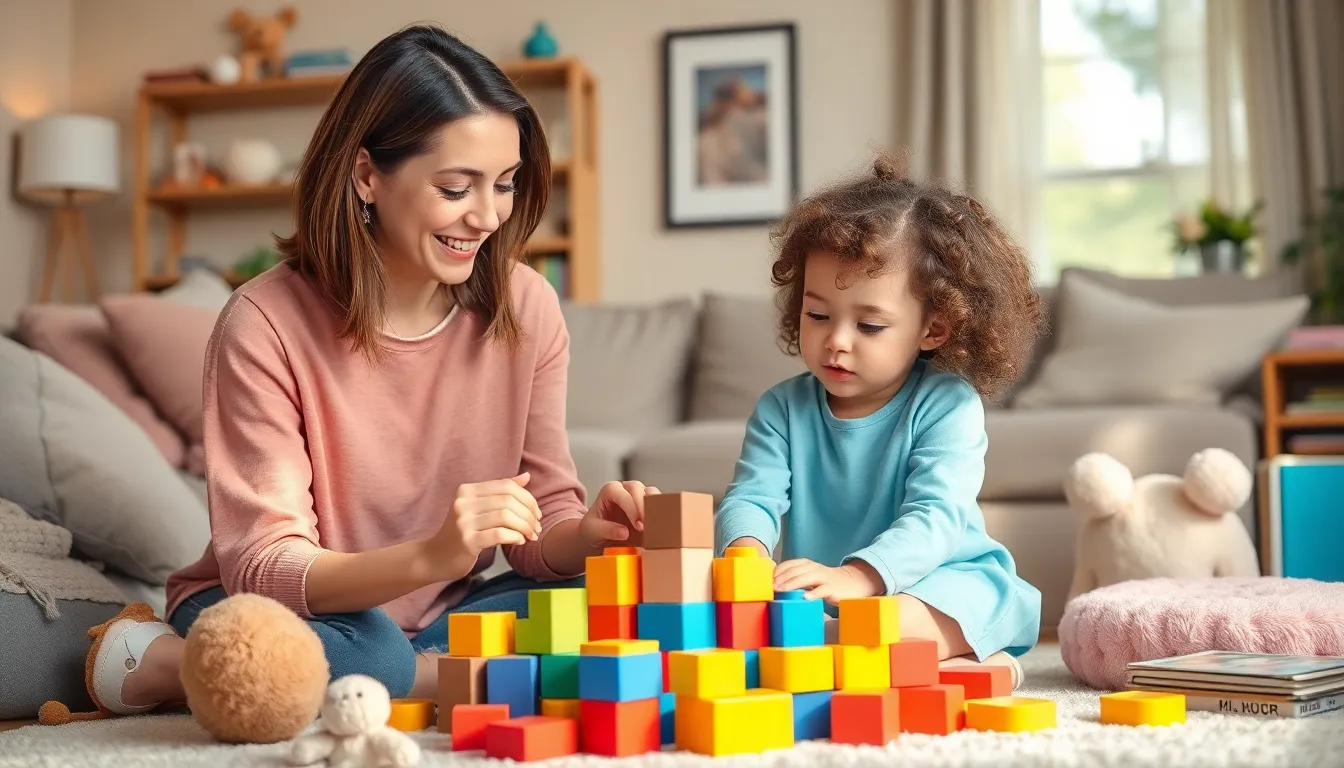In the wild world of parenting styles, authoritative parenting stands out like a superhero in a cape. It’s not about being a drill sergeant or a push-over; it’s the sweet spot where warmth meets structure. Imagine a parenting style that combines the best of both worlds—setting clear expectations while showering kids with love and support. Sounds like a dream, right?
Research shows that kids raised with authoritative parenting tend to be more confident, socially adept, and academically successful. They’re not just surviving—they’re thriving! So buckle up as we dive into the benefits of authoritative parenting, where discipline and affection join forces to raise well-rounded, happy children. After all, who wouldn’t want their little ones to grow up to be the next superheroes of society?
Table of Contents
ToggleOverview of Authoritative Parenting
Authoritative parenting combines warmth and structure, representing a balanced approach to child-rearing. Expectation clarity defines this style, where parents communicate rules and standards while remaining responsive to their children’s emotional needs. Children thrive under this nurturing guidance, developing essential life skills alongside a sense of security.
Support for this parenting method comes from extensive research, demonstrating that kids raised in authoritative environments show higher self-esteem, superior social skills, and better academic performance. Parents exhibiting consistency in their expectations foster resilience and independence in their children. When children know their parents care and believe in them, they experience greater emotional stability.
Discipline within authoritative parenting emphasizes teaching rather than punishing. Parents provide clear consequences for misbehavior, enabling children to learn from their mistakes while maintaining a trusting relationship. This mutual respect creates a positive environment, encouraging open communication.
Furthermore, the approach promotes collaboration. Parents engage their children in decision-making, allowing them to express opinions and preferences. This participation boosts children’s confidence, empowering them to take responsibility for their actions. Ultimately, authoritative parenting prepares children for successful interpersonal relationships in adulthood.
Key Characteristics of Authoritative Parenting

Authoritative parenting encompasses key traits that foster healthy development in children. This style combines warmth with structure, creating an environment conducive to growth.
Warmth and Support
Warmth and support serve as foundational elements in authoritative parenting. Parents openly express affection and provide encouragement. This emotional connection promotes secure attachments, allowing children to explore and develop confidence. Supportive parents actively listen to their children’s concerns, affirming their feelings. Research indicates that children thriving in this nurturing environment exhibit better emotional regulation and social skills. They learn to approach challenges with resilience. Consequently, these children often form strong relationships with peers and adults.
Clear Expectations and Boundaries
Clear expectations and boundaries play a crucial role in authoritative parenting. Parents communicate rules and standards explicitly, ensuring that children understand what is expected. Consistency reinforces these guidelines, helping children feel secure. Discipline focuses on teaching consequences rather than punishment, guiding children toward better choices. This clarity fosters a sense of responsibility, encouraging children to make informed decisions. Studies show that children raised in this structured atmosphere tend to excel academically and socially. Additionally, these boundaries help children develop self-discipline and respect for authority figures, preparing them for future interactions.
Benefits of Authoritative Parenting
Authoritative parenting offers numerous advantages that significantly enhance children’s growth and well-being. This section covers the key benefits of this parenting style.
Enhanced Child Development
Children raised in authoritative households experience superior developmental outcomes. Research demonstrates that these children often exhibit higher self-esteem, improved social skills, and better academic performance. Structured guidance paired with emotional support fosters their ability to navigate various social situations with confidence. Furthermore, this parenting style encourages independence, allowing kids to make choices while understanding the consequences of their actions. Parents promote critical thinking skills by engaging children in discussions, effectively preparing them for future challenges.
Improved Emotional Well-Being
Emotional well-being of children thrives in authoritative parenting environments. Parents practicing this style respond to their children’s emotional needs with empathy and understanding. This responsive approach ensures that children feel heard and validated, promoting resilience in the face of adversity. Studies indicate that children raised in such environments experience lower levels of anxiety and depression, resulting in healthier coping mechanisms. Overall, a strong emotional foundation significantly contributes to children’s ability to form meaningful relationships and handle stress throughout their lives.
Stronger Parent-Child Relationships
Parent-child relationships strengthen under authoritative parenting due to its balanced approach. Open lines of communication foster trust and transparency between parents and children. Children feel comfortable expressing their thoughts and feelings, knowing their parents will listen without harsh judgment. This openness allows for constructive conversations about boundaries and expectations. As a result, children develop a sense of security, which is essential for a thriving relationship with parents. Ultimately, these strong connections create a supportive environment that encourages children to seek guidance, enhancing their emotional growth and resilience.
Authoritative Parenting vs. Other Styles
Authoritative parenting stands out distinctly when compared to other parenting styles. It emphasizes a balance of warmth and structure, ensuring children’s emotional needs are met.
Authoritative vs. Authoritarian
Authoritarian parenting imposes strict rules without emotional support. In contrast, authoritative parenting involves setting clear expectations while encouraging open communication. Authoritative parents promote independence, allowing children to express themselves, which fosters confidence. Research indicates that children from authoritative families tend to develop higher self-esteem and better social skills compared to those raised with authoritarian approaches. Discipline in authoritative parenting is constructive, focusing on teaching lessons rather than enforcing harsh punishments. Thus, children learn responsibility in a supportive environment.
Authoritative vs. Permissive
Permissive parenting prioritizes affection but lacks boundaries. Authoritative parents, however, integrate love with clearly defined expectations. Children in authoritative homes experience guidance and support, which cultivates self-discipline and responsibility. In permissive households, children may struggle with limits, leading to difficulties in social and academic settings. Studies consistently show that children raised in authoritative environments perform better academically and socially, thanks to the balance of structure and support. Authoritative parents encourage decision-making while maintaining appropriate guidance, promoting resilience in their children.
Embracing authoritative parenting offers a powerful pathway to nurturing well-rounded and resilient children. This balanced approach fosters a secure environment where kids thrive academically and socially. By integrating warmth with clear expectations parents empower their children to develop confidence and independence.
The benefits extend beyond childhood as these children often carry their skills into adulthood. They build strong relationships and navigate challenges with resilience. Ultimately, authoritative parenting not only shapes happier children but also contributes to a healthier society by cultivating responsible and capable individuals.



